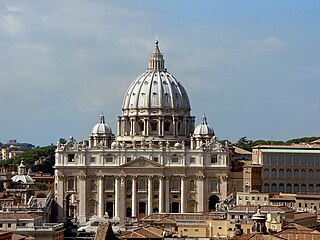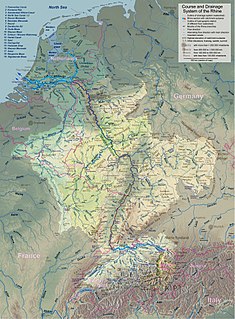
The First Vatican Council was convoked by Pope Pius IX on 29 June 1868, after a period of planning and preparation that began on 6 December 1864. This, the twentieth ecumenical council of the Catholic Church, held three centuries after the Council of Trent, opened on 8 December 1869 and adjourned on 20 October 1870. Unlike the five earlier general councils held in Rome, which met in the Lateran Basilica and are known as Lateran councils, it met in the Vatican Basilica, hence its name. Its best-known decision is its definition of papal infallibility.
The Roman Curia comprises the administrative institutions of the Holy See and the central body through which the affairs of the Catholic Church are conducted. It acts in the Pope’s name and with his authority for the good and for the service of the particular Churches and provides the central organization for the Church to advance its objectives.

Sedevacantism is the position, held by some traditionalist Catholics, that the present occupier of the Holy See is not truly pope due to the mainstream church's espousal of the heresy of modernism and that, for lack of a valid pope, the See has been vacant since the death of Pope Pius XII in 1958.
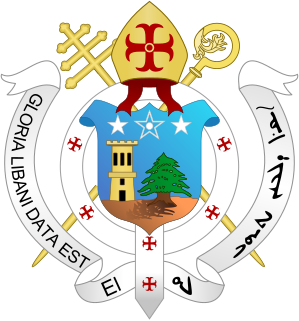
The Eastern Catholic Churches or Oriental Catholic Churches, also called the Eastern-rite Catholic Churches, and in some historical cases Uniate Churches, are twenty-three Eastern Christian particular churches sui iuris in full communion with the Pope in Rome, as part of the worldwide Catholic Church. Headed by patriarchs, metropolitans, and major archbishops, the Eastern Catholic Churches are governed in accordance with the Code of Canons of the Eastern Churches, although each church also has its own canons and laws on top of this, and the preservation of their own traditions is explicitly encouraged. The total membership of the various churches accounts for about 18 million, according to the Annuario Pontificio, thus making up about 1.5 percent of the Catholic Church, with the rest of its more than 1.2 billion members belonging to the Latin Church, also known as the Western Church or the Roman Catholic Church.
The magisterium of the Catholic Church is the church's authority or office to give authentic interpretation of the Word of God, "whether in its written form or in the form of Tradition." According to the 1992 Catechism of the Catholic Church, the task of interpretation is vested uniquely in the Pope and the bishops, though the concept has a complex history of development. Scripture and church tradition "make up a single sacred deposit of the Word of God, which is entrusted to the Church", and the magisterium is not independent of this, since "all that it proposes for belief as being divinely revealed is derived from this single deposit of faith."
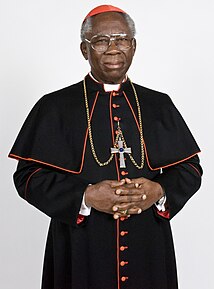
Francis Arinze is a Nigerian Cardinal of the Roman Catholic Church. He was Prefect of the Congregation for Divine Worship and the Discipline of the Sacraments from 2002 to 2008. He has been the Cardinal Bishop of Velletri-Segni since 2005. Arinze was one of the principal advisors to Pope John Paul II and was considered papabile before the 2005 papal conclave, which elected Pope Benedict XVI.
The "Pastoral Provision", in the context of the Catholic Church in the United States, refers to a set of practices and norms by which bishops are authorized to provide spiritual care for Roman Catholics coming from the Anglican tradition, by establishing parishes for them and ordaining priests from among them. The Pastoral Provision still provides a way for individuals to become priest in territorial dioceses, even though Anglicanorum Coetibus was declared which led to the establishment of Personal Ordinariates, another mechanism for former Anglicans to join the Catholic Church.

Gregorio Pietro XV Agagianian was an Armenian Cardinal of the Catholic Church. He was the head of the Armenian Catholic Church from 1937 to 1962 and supervised the Catholic Church's missionary work for more than a decade, until his retirement in 1970. He was considered papabile on two occasions.

The history of the papacy, the office held by the pope as head of the Roman Catholic Church, according to Catholic doctrine, spans from the time of Peter to the present day.
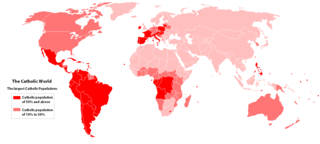
The Catholic Church in Malaysia is part of the worldwide Catholic Church, under the spiritual leadership of the Pope in Rome. The Apostolic Nuncio to Malaysia is Most Rev. Joseph Salvador Marino while the resident ambassador of Malaysia to the Holy See is Tan Sri Bernard Giluk Dompok.
The Catholic Church in Papua New Guinea is part of the worldwide Catholic Church, under the spiritual leadership of the Pope in Rome. Papua New Guinea has approximately two million Catholic adherents, approximately 27% of the country's total population.
The term Salvatorians refers to members of the Society of the Divine Savior, a religious institute of the Catholic Church with priests, deacons, brothers, and clerics serving in more than 40 countries throughout world. The title "Divine Savior" is a reference to Jesus Christ. The patrons are Mary, mother of Jesus, under her title "Mother of the Savior," the Apostles, Saint Michael the Archangel, and Saint Joseph. The patronal feast of the Society of the Divine Savior is Christmas Day. The Salvatorians celebrate October 11 as the "Solemnity of Mary, Mother of the Savior." Other important liturgical celebrations include Pentecost Sunday and September 5, the Feast of Blessed Mary of the Apostles.

Annibale Bugnini was a Roman Catholic prelate. Ordained in 1936 and named archbishop in 1972, he was secretary of the commission that worked on the reform of the Catholic liturgy that followed the Second Vatican Council. Critics of the changes made to the Catholic Mass and other liturgical practices before and after Vatican II consider him a controversial figure. He held several other posts in the Roman Curia and ended his career as papal nuncio to Iran, where he acted as an intermediary during the Iran hostage crisis of 1979–1981.
The 1983 Code of Canon Law, also called the Johanno-Pauline Code, is the "fundamental body of ecclesiastical laws for the Latin Church". It is the second and current comprehensive codification of canonical legislation for the Latin Church sui iuris of the Catholic Church. It was promulgated on 25 January 1983 by John Paul II and took legal effect on the First Sunday of Advent 1983. It replaced the 1917 Code of Canon Law, promulgated by Benedict XV on 27 May 1917.

The history of the Roman Curia, the administrative apparatus responsible for managing the affairs of the Holy See and the Catholic Church, can be traced to the 11th century when informal methods of administration began to take on a more organized structure and eventual a bureaucratic form. The Curia has undergone a series of renewals and reforms, including a major overhaul following the loss of the Papal States, which fundamentally altered the range and nature of the Curia's responsibilities, removing many of an entirely secular nature.
In the liturgical traditions the Roman Catholic Church the term ordination refers to the means by which a person is included in one of the orders of bishops, priests or deacons. The teaching of the Catholic Church on ordination, as expressed in the Code of Canon Law, the Catechism of the Catholic Church, and the apostolic letter Ordinatio Sacerdotalis, is that "only a baptized man validly receives sacred ordination" and "that the Church has no authority whatsoever to confer priestly ordination on women and that this judgment is to be definitively held by all the Church's faithful." Additionally, the Roman Catholic Church currently ordains only men as deacons.

The following outline is provided as an overview of and topical guide to the Catholic Church:
A notification by the Holy See is an official announcement by a department of the Holy See, the leadership of the Catholic Church in Rome.
Pope Francis issued the document Magnum principium dated 3 September 2017 on his own authority. It modified the 1983 Code of Canon Law to shift responsibility and authority for translations of liturgical texts into modern languages to national and regional conferences of bishops and restrict the role of the Congregation for Divine Worship and the Discipline of the Sacraments (CDW). It was made public on 9 September and its effective date is 1 October.
